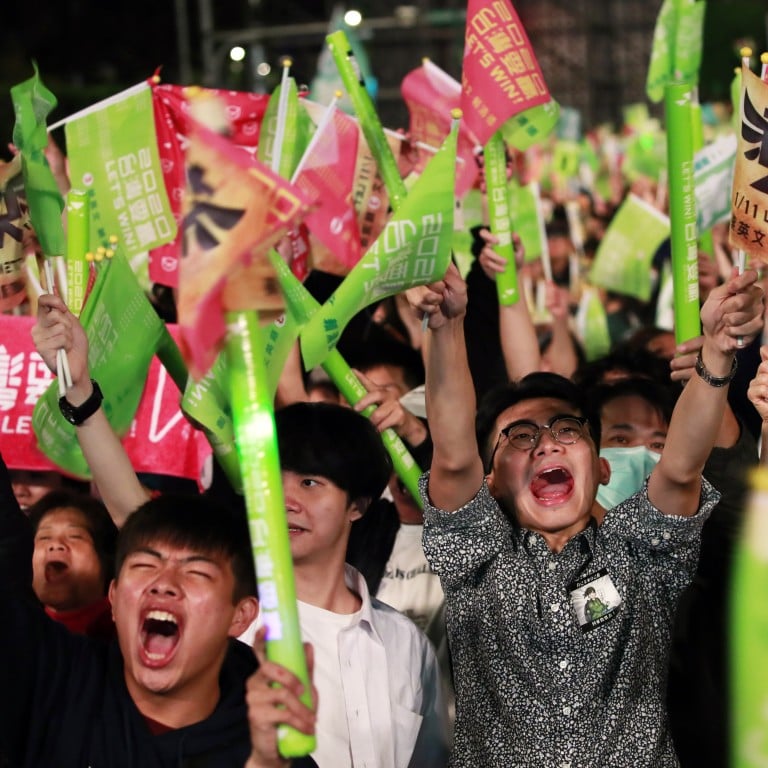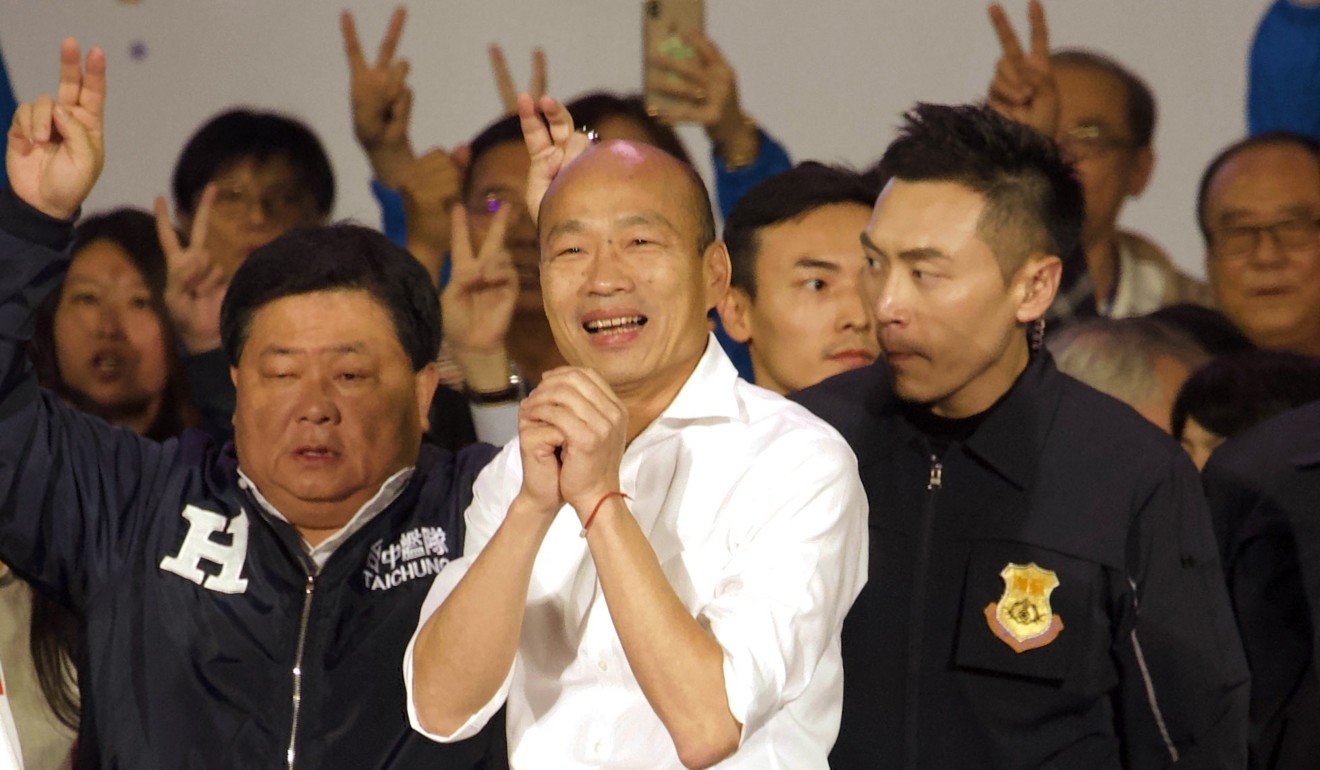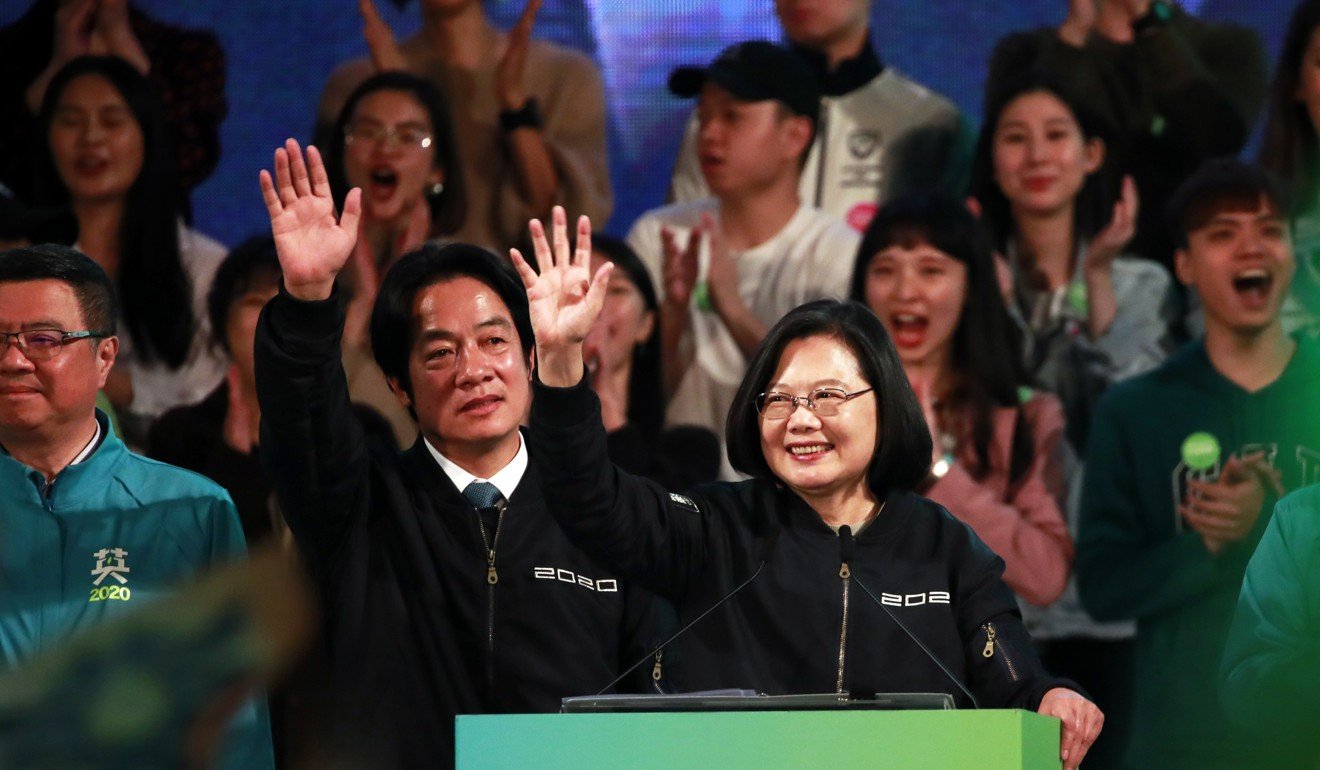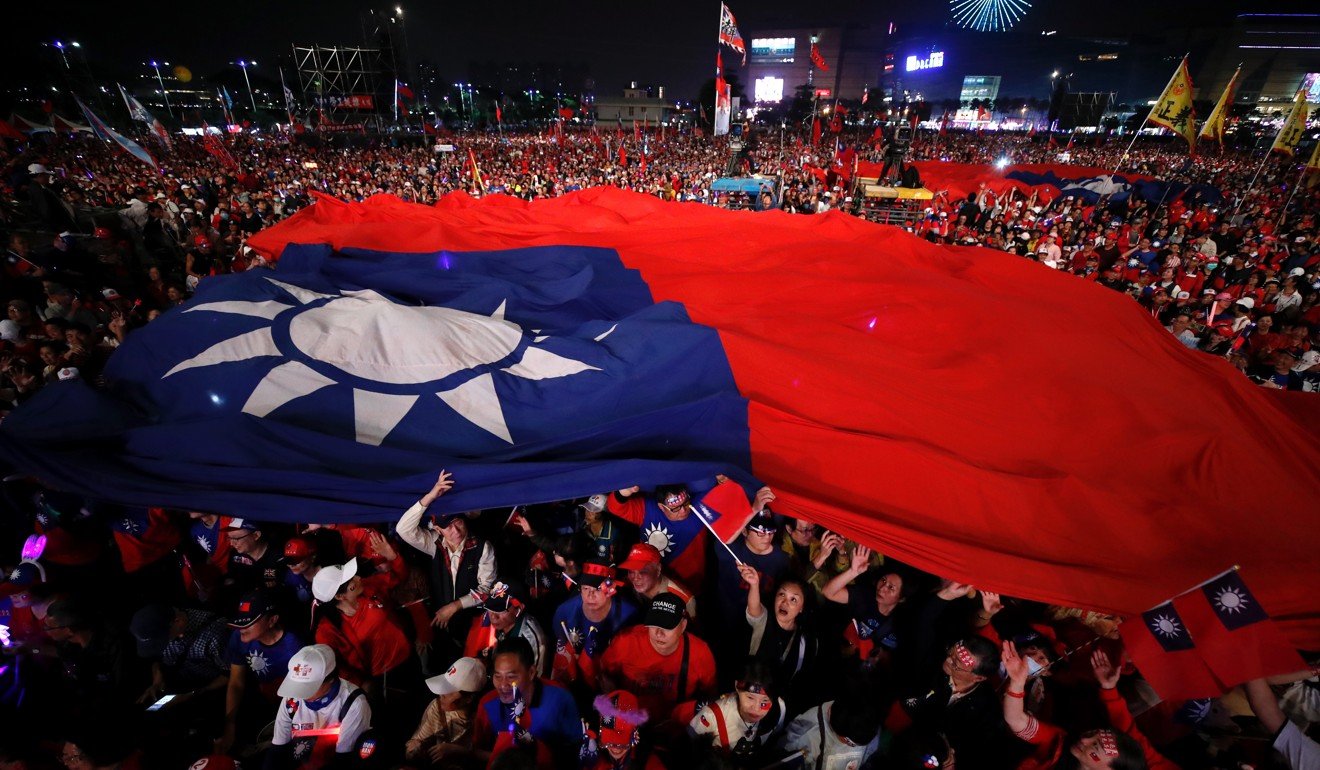
Taiwan election rivals Tsai Ing-wen and Han Kuo-yu make final pitch to voters
- President’s supporters gather in Taipei on night before election with candidate looking to be on course for re-election
- Tsai’s ruling Democratic Progressive Party has a big majority in parliament but Han’s popularity could help the KMT close the gap
“Every one of us must vote!” Tsai told the cheering crowd at the rally. “This is for the sake of the young people in Taiwan, for the sake of their future!”
“Tsai Ing-wen, elect! 2020, Taiwan will win!” the crowds chanted. “Legislature! More than half!”
While Han is trailing in the opinion polls, the possibility of defeat was not on the minds of his supporters as he took to the stage to face a sea of flags for the Republic of China, the official name for Taiwan.
“Hello, our president!” they roared.
For Taiwan’s voters, election is about more than Beijing and Washington
While analysts are expecting a big win for Tsai in the presidential poll – influenced by factors such as disunity in the KMT, Han’s personal gaffes and Tsai’s strong stance against Beijing following months of anti-government protests in Hong Kong – there is less certainty about the outcome of the legislative elections and whether the DPP can hold on to its majority there.
Of the 113 seats in the Legislative Yuan, the island’s parliament, the DPP currently has 68 and the KMT 35.
More than 19.3 million Taiwanese are eligible to vote and the candidates have been working hard in the final days of campaigning to win as much support as they can, with Han holding another mass rally in Kaohsiung on Friday while Tsai carried on campaigning between events in Kaohsiung, New Taipei City and Taipei.

Taiwan’s parliament is made up of 73 district seats, 34 “at-large” seats which are filled from party lists, and six reserved for indigenous Taiwanese. A total of 650 candidates will contest Saturday’s poll, of whom 412 are running for district seats, 217 for at-large seats and 21 for the indigenous Taiwanese.
The allocation of the at-large seats will be determined by the number of votes cast for each party, which must also receive at least 5 per cent of the vote to qualify. The DPP is fielding 102 candidates on Saturday, and the KMT 107.
Observers say that although Tsai is on course to retain the leadership, if the KMT wins the 57 seats needed for a majority in the legislature, it will make it difficult for her to push through her policies.
Lai I-Chung, president of the Prospect Foundation, a Taiwanese think tank, said that the “issue people are concerned about right now” is which party would win a majority.
“Usually the Taiwan election has the effect of the so-called mother hen taking care of the smaller chickens, so a strong presidential candidate will be able to help swing the [legislative] candidates,” he said.
“[But in] the KMT right now, the presidential candidate is [going] against the wind, so that will make it difficult.”
Tsai Ing-wen poised to complete improbable political comeback
Chen Kuang-hui, a professor of political science at National Chung Cheng University, said at a forum organised by Taiwan’s foreign ministry on Thursday that despite Han’s and the KMT’s best efforts, Tsai looked to have an unassailable lead.
“Both sides are working very hard to mobilise their voters … especially the DPP which is concerned about their young voters because if they don’t cast their votes, it is possible that Han will have more of a share in the final results,” he said.
“But overall, the gap between Tsai and Han is quite wide.”

On Ketagalan Boulevard on Thursday, legal worker Steve Shih was among those who had turned out to support Han.
“I am here to add to Han’s numbers and show Tsai Ing-wen and the DPP the Taiwanese people’s true will,” the 30-year-old said.
“We support Han Kuo-yu not because we want to support the Chinese Communist Party but to support ourselves and to bring down the DPP, this dictatorial regime.”
Taiwan’s main parties warn of disinformation and ‘fake news’
Standing on the sidelines of the rally was Tsai supporter Chen Ting-an, a 22-year-old student.
She said the most important issues for her were same-sex marriage and Tsai’s strong response to threats from Beijing.
“Fundamentally, all of us just want Taiwan to be better, but it’s just that everyone sees things differently and we see different directions and methods for Taiwan’s future,” she said.
“My personal wish is that more people in Taiwan can embrace our Taiwanese identity. For younger people, it is more natural for us to recognise Taiwan as a country … it is natural that we think we are Taiwanese and grew up here, and that Taiwan’s history has absolutely no relation to mainland China.”

Jossie Yang, 37, a vet working in Taipei, said she was voting for Tsai for the second time because of her policies supporting Taiwan’s sovereignty, her stance against Beijing, strengthening Taiwan’s diplomacy, social equality, and the passing of a same-sex marriage law.
“I think she will win,” Yang said. “We have seen in the election this time that because of Hong Kong, how we need to cherish our democracy.
“While I don’t think that Taiwan will become like Hong Kong immediately, especially because we have our institutions in place, everyone needs to vote tomorrow, no matter who they support because it is a critical part of our democratic system.”
Tsai also sought to capitalise on such concerns during her rally, telling supporters that Taiwan should be a model for Hong Kong in practising democracy. “The young people of Hong Kong are watching you!“ she said. “Democracy must win, freedom must win ... Taiwan must win!”
Chinese university deletes study forecasting win for Tsai
A Tsai supporter waving an LGBT rainbow flag with the map of Taiwan on it said at the rally that it was important to come out to galvanise voters who were still undecided or who felt their votes would not matter.
“Our democracy was hard fought so we need to vote,” said the 25-year-old accountant who gave her name as JL.
“If the president is bad and you don’t vote, you give up your chance to have your voice heard.”
JL said she voted for Eric Chu (of the KMT) in the 2016 presidential election.
“I feel very sorry I didn’t vote for Tsai last time but now that I have read and understood more about the KMT’s ‘white terror’ period, I know more about what that party stands for,” she said.
“Tsai is the one who cares about Taiwan’s democracy, Hong Kong, and the rights of the LGBT and marginalised communities [in society], but I am voting for her because she has helped Taiwan’s economy grow stronger.”

